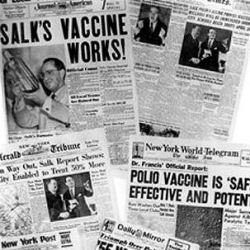Public health is our passion at ACSH. We want to promote public health while simultaneously preserving individual liberty. That's been our goal since we were founded in 1978.
On rare occasions, however, a heavy-handed approach may be necessary. We believe that is the case for vaccines, which should be mandatory. The reason, as Dr. Josh Bloom and I wrote for Newsweek, is "the right of anti-vaxxers to be sick ends where the public's right to health begins."
Consider this: I have a newborn daughter who is too young to receive the MMR vaccine. We are hesitant to take her out in public places because Washington is one of the states that had a measles outbreak due to a large number of healthy people choosing to forgo vaccines. This is unjust. My daughter's health should not be threatened by selfish people, much in the same way that her safety should not be threatened by a drunk driver. As Dr. Ethan Siegel and I wrote for Scientific American, anyone who thinks that the rules don't apply to them should be prevented from participating in society.
Slowly, but surely, it seems that policymakers are beginning to see things our way. Indeed, vaccine and public health laws in general are tightening across the country. Here's what's happened in recent months:
- Maine eliminated religious and philosophical exemptions for vaccines. As CNN reported, it joined California, West Virginia, and Mississippi in only allowing medical exemptions.
- Speaking of California, the LA Times reported that "a few unscrupulous doctors are peddling medical exemptions for phony reasons," so lawmakers are looking to make one of the nation's toughest vaccine laws even tougher, despite Jessica Biel's best efforts.
- Washington State also banned personal and philosophical exemptions. Unfortunately, this policy only covers MMR when it should extend to most (if not all) childhood vaccines.
- In an effort to curtail the measles outbreak in New York City, public health officials required unvaccinated people in certain hotspots within the city to get the MMR vaccine. Those who did not comply were issued a summons, which could cost them $1,000.
- Rockland County, New York banned unvaccinated minors from many public spaces (but the policy was put on hold by a judge).
Nobody revels in coercive policies like these. Sadly, they've become necessary because the most vulnerable among us -- children and the immunocompromised -- are no longer being adequately protected by society. Expect more such laws to pass until people wake up.

